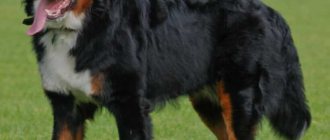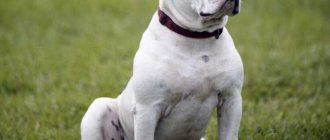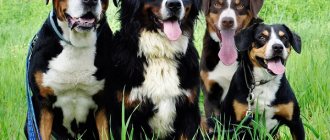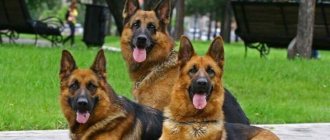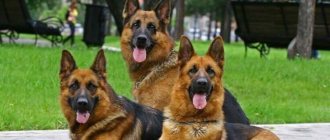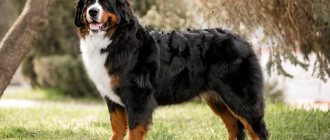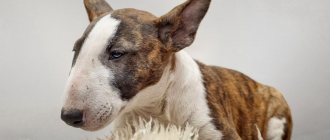Review author: “ZooVita”
Bernese Mountain Dogs originate from Switzerland, where they are highly valued not only as companions and pets, but also as working dogs. In their homeland, they are classified as Mountain Dogs and are known as true gentle giants, especially good with children of all ages.
Features of dogs of the Bernese Mountain Dog breed
Always ready to please, they are by nature very loyal and affectionate characters. They can boast that they are one of the smartest dogs on the planet, which makes them easy to train.
An extremely beautiful dog with a beautiful tri-colored coat, which is one of the defining physical characteristics of the Bernese Mountain Dog.
They are a great choice for first-time dog owners, but they need plenty of daily exercise as well as mental stimulation to become truly happy and balanced.
What to feed?
Owners must decide in advance what type of food will form the basis of the diet. When feeding natural food, the menu must be carefully calculated. Dishes consist of lean meat, cereals, vegetables and fruits. For good kidney function, add a little salt to food.
Bernese Mountain Dogs must be given 1 tbsp. l gelatin per day. The substance helps strengthen cartilage and ligaments.
Reviews from owners indicate that Bernese dogs best digest super premium dry food. After eating, the dog needs rest, otherwise digestive problems will occur.
History of the origin of the Bernese Mountain Dog breed
The Bernese Mountain Dog is believed to have ancestors that date back to Roman times, when this type of dog was used to herd livestock across the Alps.
As these dogs became popular in different regions of their native Switzerland, each community developed a specific type of dog to suit their needs.
Thus, four types of Mountain Dogs were created: the Entlebucher, the smallest dog of this type, the Appenzeller, which is slightly larger, the Bernese, and finally the Great Swiss Mountain Dog, which is the largest of them all.
In the early 20th century, Professor Heim, a huge fan of the breed, worked hard to promote and develop the dog we see today.
With that said, the Bernese breed has its roots in the canton of Bern, which is a region of Switzerland where they were highly prized herding dogs used in the high mountain pastures where large herds grazed.
They were also used to pull milk carts and as avalanche rescue dogs.
Today, the Bernese Mountain Dog is known throughout the world not only as an excellent working dog, but also as a loyal, devoted companion and pet due to its sweet, kind, reliable and obedient nature. It is especially tolerant of children and other animals.
Interesting Facts
Few people know that at the end of the 14th century, the burgomaster of Zurich issued a decree banning the keeping of large dogs. According to this decree, all Berns were subject to death, as they destroyed the vineyards of wealthy wine farmers. Ordinary farmers and city residents stood up for the good-natured animals, and the burgomaster himself was executed.
This is not the only interesting fact about these dogs:
- The Bernese Mountain Dog has two other official names: Bernese Mountain Dog and Dürrbächler;
- Berns do not have any special guarding abilities, but they can create a formidable appearance. Dogs bark loudly at strangers, but do not try to detain them;
- When the breed was at the peak of its popularity, people flocked to Switzerland to purchase a good-natured giant from local farmers for a fairly impressive amount of money;
- The tricolor color of the Bernese Mountain Dog gave the animal a mystical quality. Many ancient Alpine residents believed that through Sennenhunds they could turn to the gods, since dogs were given another pair of eyes for this - tan;
- Bern is not so much a reliable guard as an excellent assistant. Previously, these animals helped people transport carts and carts. During the war, Swiss Shepherds carried small artillery pieces. Over the two thousand years of the breed’s formation, the dogs completely lost their hunting instincts;
- The Bernese Shepherd belongs to the second group according to the FCI qualification, section number 3 - “Swiss Cattle Dogs”.
Appearance of a dog of the Bernese Mountain Dog breed
Externally, the dogs are large, the average weight of the Bernese Mountain Dog reaches: males 35-55 kg, females 35-45 kg. The second largest of the four Sunnerhund working dogs, the Brennian Mountain Dog is 64-70 cm tall for males, 58-66 cm for females.
They are very similar to the Golden Retriever, only heavier and have a stockier build. They are attractive dogs with personalities that match their robust appearance. However, it is their beautiful coloring that really makes these dogs stand out from the crowd.
These dogs boast striking facial features with a well-defined nose on a straight, strong muzzle. Their eyes are almond-shaped and dark brown in color.
The ears are medium in size, triangular in shape, set high on the dog's head. When relaxed, the ears lie flat, but when alert or excited, dogs raise them slightly, pointing forward.
Bernese boast a strong jawline with a perfect scissor bite, where the upper teeth neatly overlap the lower teeth. Their necks are muscular and strong, of medium length.
The forelimbs are muscular, long with sloping shoulders, which are at a very clear angle. Their front legs are straight and well boned. These dogs are compact in appearance with a shorter rather than long body.
They boast a broad chest and a beautiful deep sternum with well-defined ribcages, a strong, powerful loin, a firm and level back, flowing into a smooth, rounded croup.
Their hind legs are strong and wide, with good muscles. The paws are compact, short and round. Bernese boast a bushy tail, which they raise when working or alert, but never curl it over their back.
As for the coat, in reality and in photos, Bernese Mountain Dogs always have silky soft coat with a natural shine. Their hair is long and slightly wavy, without any curls.
As mentioned earlier, it boasts an elegant and attractive coat that is jet black with reddish markings on the cheeks, above the eyes, as well as on the chest and all four legs.
They also have a very bright white patch and white markings on the chest, giving them a very distinguished appearance. The dogs also have white paws, although some do not, which is also a breed standard.
Reviews
Inga, Moscow: “I dreamed of a big purebred dog since childhood, after watching the film “Beethoven.” Having bought a mountain dog, I don’t regret it at all. A shaggy tornado has taken up residence in the apartment! A cheerful, playful dog, his very appearance lifts your spirits.”
Alena K. Novosibirsk: “You can’t think of a better dog for a family with small children. The Sennenhund is distinguished by angelic patience. One minus of the breed is that it really has a lot of wool. But this can be solved by frequent brushing and the right shampoo.”
Sergey M. Volgograd: “Funny, charming, just a gorgeous dog. Despite its impressive size, it is light and graceful. I would like to note the intelligence of the Sennenhund. The dog is not just smart, she literally understands everything at a glance. You couldn’t ask for a better friend.”
Temperament of Bernese Mountain Dogs
The Bernese Mountain Dog is known to be a very intelligent character and a joy to be around. They are a good choice for first-time owners as people have time to spend with their canine companions because they need plenty of exercise, mental stimulation and grooming.
Being such large dogs also need space to move around and they do not tolerate being left to their own devices for long periods of time, especially when they are young.
After a walk, they are more than happy to relax when they return home. They are known to be surprisingly quiet, loving nothing more than to spend a few hours dozing while keeping a close eye on what's going on around them.
Bernese Mountain Dogs typically reach their adult height at around 15 months of age, but take much longer to reach full maturity, which can take 2 to 3 years.
They are known to be fun-loving, but if they are not well socialized at a young age and trained properly, they can become a bit rowdy and unruly.
However, when treated well and properly trained, these dogs can boast a calm, reliable and even-tempered temperament, showing great loyalty and affection, as well as patience towards their owners and especially younger family members.
They love being part of a family and love nothing more than being involved in everything that happens in the family. They are known for “following people.”
Care
Grooming takes time, but not much; brushing the coat several times a week is enough. Just given the size of the dog, this can be time consuming.
Although their fur itself is clean and repels dirt, it sheds and can become tangled. Unless owners want to trim their dogs' hair in hot weather, they don't need grooming at all.
But they shed heavily; hair can cover walls, floors and carpets. It falls off them in clumps, combing them out helps, but not that much. As the seasons change, Bernese Mountain Dogs shed even more. This happens twice a year, and then a cloud of wool follows them.
If anyone in your family suffers from allergies, then this is definitely not the best choice among breeds. They are also not suitable for neat or clean people who are irritated by dog hair.
Like other breeds, Bernese puppies need to be introduced to brush, water and scissors from a young age. Although obedient and soft, they are still large and strong. If they don’t like the procedures, it’s difficult to keep them. It is much easier to train a 5 kg puppy than a 50 kg adult dog.
Particular attention should be paid to the ears as they can accumulate bacteria, dirt and fluid, leading to inflammation and infection.
Training of Bernese Mountain Dogs
Bernese Mountain Dogs are intelligent, which makes them quite easy to train, but they need to start early. Puppies need to be well socialized from an early age so that they grow up to be confident. The Bernese Mountain Dog is a very sensitive character by nature and does not like to be yelled at.
It is best to keep training sessions fun and short so that your puppy or young dog can focus on what is required of them. All puppies are incredibly cute, which means they are very easy to spoil when they first arrive at their new home.
However, owners need to start with what they're going to do next, and that means setting rules and boundaries so puppies understand what's acceptable and what's not.
Socialization
The Bernese Mountain Dog or Bernese Shepherd will make friends with anyone whom the owner brings into the house: a significant other, a child, a kitten, a hamster or a parrot. The dog perceives everyone as friends.
Bern gets along well with other pets. Friendship with cats is possible if a Bernese Mountain Dog puppy grows up and lives with kittens from the first months.
Bernese Mountain Dogs love children. They will never offend them, unless they accidentally push them or crush them with their fifty kilograms. But they won’t become nannies. The pets will play with the kids, but they will quickly get tired and leave the kids to another place.
At the same time, the Bernese Cattle Dog fiercely protects the child. His safety is the most important thing. More important than the master's orders. If the pet thinks that following a command will harm the baby, it will refuse to obey.
Health of the Bernese Mountain Dog breed
The average life expectancy of a Bernese Mountain Dog is 7 to 8 years with proper care and quality nutrition, a well-balanced diet appropriate for their age.
Overall, these dogs are healthy, but like many other pure breeds, they tend to suffer from a few hereditary problems that are worth being aware of if you plan to share your home with one of them. Health problems most common in the breed include the following:
- Degenerative myelopathy (DM)
- Hip Dysplasia – DNA Test Available
- Elbow Dysplasia – DNA Test Available
- Malignant histiocytosis or systemic histiocytosis Hypomyelinogenesis (Trembler)
- Bloating/gastric torsion
- Other health problems known to affect Bernese
The Bernese Mountain Dog is one of the breeds prone to heat stroke due to its black coat. Thus, you should always keep an eye on how long your dog stays in the sun during the hot summer months.
Some Bernese dogs may develop vision problems, the most common of which are entropion and ectropion.
However, reputable breeders will never use a dog suffering from any of these conditions in a breeding program that reduces the risk of their offspring inheriting these eye problems.
Diseases
The lifespan of the Bernese Mountain Hound is about 8-10 years. The dog owner is responsible for the health of his pet and by regularly examining the dog, he will help it live a long life.
Mountain hounds are most often diagnosed with:
- Weeping eczema. The disease causes severe discomfort in the dog. Pustules can appear after insect bites, exposure to dust or dirt on the skin. Constantly keeping the dog near a heat source, stress and poor diet increase the risk of eczema.
- Umbilical hernia, which is diagnosed in puppyhood.
- Eye diseases: cataracts, progressive retinal atrophy, entropion.
- Congenital diseases can also shorten a dog's life. A hereditary disease of Bernese Mountain Hounds can include histiocytosis, accompanied by refusal to eat, arrhythmia, weakness and fever.
- Cancer diseases.
Diseases are a consequence of poor nutrition and care, and a sedentary lifestyle.
Rules for keeping the Bernese Mountain Dog breed at home
As with other breeds, Bernese Mountain Dogs require regular grooming to keep their coat and skin in tip-top condition. They also need to exercise regularly to stay fit and avoid gaining too much weight.
On top of this, they should receive a high-quality, well-balanced diet that meets all their nutritional needs throughout their lives. Another thing to keep in mind is that the cost of caring for a Bernese Mountain Dog is much higher than many other breeds due to their larger size.
It's also important to look after their ears because air may not be circulating as well as it should. Moisture tends to accumulate in a dog's ear canal, creating the perfect environment for a yeast infection to spread. This type of infection is known to be difficult to cure.
How much do puppies cost?
The price of burns is off the charts. Even in poultry markets they are sold from 10,000 rubles. On sales boards, under advertisements with photos of Bernese Mountain Dog puppies, there are numbers of 30 - 60 thousand rubles.
And this is not the limit. In nurseries, a pet-class puppy costs 40-50 thousand rubles, breeding costs from 75,000 rubles, and the cost of a show class exceeds 100,000 rubles.
Nurseries
It is better to buy Bernese Mountain Dogs from professional nurseries. This is a guarantee that your four-legged friend will be healthy and free of breed defects.
You can view photos of the Bernese Shepherd, the dogs' achievements, the pedigrees of the parents and buy a puppy in the following kennels:
- https://www.sen-rus.ru – Moscow;
- https://www.charmingbear.ru/?yclid=18368218457060179802 – Moscow region;
- https://libenbern.jimdo.com – St. Petersburg.
The Bernese Mountain Dog breed is amazing. She has a lot of nobility, devotion and love. The owners of the Berns claim that from the first to the last day of living with the dogs they cannot believe that this happiness is theirs.
Nutrition for Bernese Mountain Dogs
When describing the Bernese Mountain Dog, it is important to note its diet. If you get a puppy from a breeder, they will provide you with a feeding schedule and it is important to stick to the same schedule, feeding the puppies the same food to avoid tummy upsets.
You can change your puppy's diet, but it must be done very gradually. Always making sure that they don't get any indigestion in the process. If this happens, it is best to return them to their original diet and discuss this with your veterinarian before attempting to change the diet again.
Mature Bernese Mountain Dogs need to be fed a quality, well-balanced diet that is appropriate for the different stages of their lives.
However, contrary to what you may think, they do not need to be fed large amounts of food. Overfeeding your dog will lead to obesity, which can significantly shorten their already short lifespan.
It is also very important to feed your Bernese small meals rather than large ones throughout the day to reduce the risk of gastric volvulus (bloating). It is equally important to correctly determine the feeding time of the Bernese and not take the dogs out for a walk immediately after they have eaten, or feed them too early upon their return.
How to choose a puppy
Before purchasing a Bernese Mountain Dog puppy, you need to know everything about the breed. Moreover, articles and photos on the Internet are a bad option. They read professional literature, communicate with breeders and dog handlers, visit exhibitions where you can meet the dogs in person.
The main thing is to choose a trusted nursery with a responsible owner. The owner of the puppy's parents will become a mentor and assistant for the rest of the pet's life.
The puppy is taken away from its mother at 2-4, maximum 6 months. At this age, the baby is receptive and easily adaptable. Older pets have a hard time getting used to a new owner or do not accept him at all.
Photos of dogs of the Bernese Mountain Dog breed
Video review
The Mountain Dog breed is one of the most beautiful dogs in the world. A selection of photos and a video review will allow you to verify this statement.
A graceful, powerful and beautiful representative of the Mountain Dog breed will easily fit into the family and become an excellent companion and friend. Starting from early childhood, the dog will be ready to do anything for its owner. First of all, thanks to endless devotion, the Mountain Dog breed has gained popularity.
